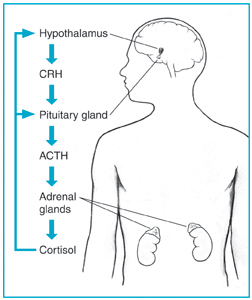Secondary adrenal insufficiency pathophysiology: Difference between revisions
Jump to navigation
Jump to search
| Line 9: | Line 9: | ||
==Pathophysiology== | ==Pathophysiology== | ||
* [[Hypothalamus]] produces [[corticotropin releasing hormone]] ([[CRH]]) that stimulates pituitary gland's | * [[Hypothalamus]] produces [[corticotropin releasing hormone]] ([[CRH]]) that stimulates [[pituitary gland]]'s corticotrophs to release [[adrenocorticotroph hormone]] ( [[ACTH]]). | ||
* [[Anterior pituitary]][[gland]'s | * [[Anterior pituitary]] [[gland]]'s corticotroph cells produce [[ACTH]] that in turn stimulates [[adrenal cortex]]'s [[zona glomerulosa]] to produce [[cortisol]]. | ||
* [[Cortisol]] is produced by [[zona glomerulosa]] of the [[adrenal gland]] and provides feedback to [[pituitary]] and [[hypothalamus]]. | * [[Cortisol]] is produced by [[zona glomerulosa]] of the [[adrenal gland]] and provides feedback to [[pituitary]] and [[hypothalamus]]. | ||
| Line 16: | Line 16: | ||
===Pathogenesis=== | ===Pathogenesis=== | ||
*Secondary adrenal insufficiency is caused by the processes occurring outside [[adrenal glands]]: [[pituitary]] causes, drugs, genetic causes. | * Secondary adrenal insufficiency is caused by the processes occurring outside [[adrenal glands]]: [[pituitary]] causes, drugs, genetic causes. | ||
*These disease processes causes the decreased production of [[adrenocorticotrophic hormone]] ([[ACTH]]). | * These disease processes causes the decreased production of [[adrenocorticotrophic hormone]] ([[ACTH]]). | ||
*[[Chronic steroid]] therapy causes suppression of [[hypothalamic pituitary adrenal axis]] ([[HPA]]) axis. | * [[Chronic steroid]] therapy causes suppression of [[hypothalamic pituitary adrenal axis]] ([[HPA]]) axis. | ||
*In some cases of adrenal insufficiency, [[hyponatremia]] is seen due to an abnormal increase in [[antidiuretic hormone]]([[ADH]]) which in turn caused due to deficiency of cortisol due to decreased excretion of free water. The feedback loop causes secretion of [[corticotropin-releasing hormone]] ([[CRH]]), again an [[ADH]] [[secretagogue]]. There is a negative feedback on [[CRH]] and [[ACTH]] by [[cortisol]]. In adrenal insufficiency, this effect is removed and [[cortisol]] inhibits [[ADH]] excretion directly showing the reciprocal relation of [[ADH]] increase when [[cortisol]] is low. [[ADH]] inappropriate secretion leads to more water absorption leading to [[hyponatremia]].<ref name="pmid25699130">{{cite journal |vauthors=Jessani N, Jehangir W, Behman D, Yousif A, Spiler IJ |title=Secondary adrenal insufficiency: an overlooked cause of hyponatremia |journal=J Clin Med Res |volume=7 |issue=4 |pages=286–8 |year=2015 |pmid=25699130 |pmc=4330026 |doi=10.14740/jocmr2041w |url=}}</ref> | * In some cases of adrenal insufficiency, [[hyponatremia]] is seen due to an abnormal increase in [[antidiuretic hormone]]([[ADH]]) which in turn caused due to deficiency of cortisol due to decreased excretion of free water. The feedback loop causes secretion of [[corticotropin-releasing hormone]] ([[CRH]]), again an [[ADH]] [[secretagogue]]. There is a negative feedback on [[CRH]] and [[ACTH]] by [[cortisol]]. In adrenal insufficiency, this effect is removed and [[cortisol]] inhibits [[ADH]] excretion directly showing the reciprocal relation of [[ADH]] increase when [[cortisol]] is low. [[ADH]] inappropriate secretion leads to more water absorption leading to [[hyponatremia]].<ref name="pmid25699130">{{cite journal |vauthors=Jessani N, Jehangir W, Behman D, Yousif A, Spiler IJ |title=Secondary adrenal insufficiency: an overlooked cause of hyponatremia |journal=J Clin Med Res |volume=7 |issue=4 |pages=286–8 |year=2015 |pmid=25699130 |pmc=4330026 |doi=10.14740/jocmr2041w |url=}}</ref> | ||
==Genetics== | ==Genetics== | ||
Revision as of 21:33, 10 October 2017
|
Secondary adrenal insufficiency Microchapters |
|
Diagnosis |
|---|
|
Treatment |
|
Case Studies |
|
Secondary adrenal insufficiency pathophysiology On the Web |
|
American Roentgen Ray Society Images of Secondary adrenal insufficiency pathophysiology |
|
Risk calculators and risk factors for Secondary adrenal insufficiency pathophysiology |
Editor-In-Chief: C. Michael Gibson, M.S., M.D. [1] Associate Editor(s)-in-Chief: Amandeep Singh M.D.[2]
Overview
Secondary adrenal insufficiency is caused by the processes occurring outside adrenal glands: pituitary causes, drugs, genetic causes.These disease processes causes the decreased production of adrenocorticotrophic hormone (ACTH).
Pathophysiology
- Hypothalamus produces corticotropin releasing hormone (CRH) that stimulates pituitary gland's corticotrophs to release adrenocorticotroph hormone ( ACTH).
- Anterior pituitary gland's corticotroph cells produce ACTH that in turn stimulates adrenal cortex's zona glomerulosa to produce cortisol.
- Cortisol is produced by zona glomerulosa of the adrenal gland and provides feedback to pituitary and hypothalamus.

Pathogenesis
- Secondary adrenal insufficiency is caused by the processes occurring outside adrenal glands: pituitary causes, drugs, genetic causes.
- These disease processes causes the decreased production of adrenocorticotrophic hormone (ACTH).
- Chronic steroid therapy causes suppression of hypothalamic pituitary adrenal axis (HPA) axis.
- In some cases of adrenal insufficiency, hyponatremia is seen due to an abnormal increase in antidiuretic hormone(ADH) which in turn caused due to deficiency of cortisol due to decreased excretion of free water. The feedback loop causes secretion of corticotropin-releasing hormone (CRH), again an ADH secretagogue. There is a negative feedback on CRH and ACTH by cortisol. In adrenal insufficiency, this effect is removed and cortisol inhibits ADH excretion directly showing the reciprocal relation of ADH increase when cortisol is low. ADH inappropriate secretion leads to more water absorption leading to hyponatremia.[1]
Genetics
- Secondary adrenal insufficiency is also caused by genetic disorders.
- Combined pituitary hormone deficiency (CPHD)
- Proopiomelanocortin deficiency (POMC)[2]
- POMC deficiency is transmitted in autosomal recessive transmission pattern.
- Genes involved in the pathogenesis of POMC deficiency include POMC gene.
- Genes involved in the pathogenesis of CPHD include PROP-1 where ACTH deficiency occurs in the end after GH, Prolactin, TSH, LH/FSH deficiencies. Other genes in CPHD include HESX1, LHX3, LHX4 and SOX3.
Associated Conditions
Gross Pathology
- The gross pathology features are dependent on the cause. For the gross pathology, when secondary adrenal insufficiency is caused by hypopituitarism, click here.
Microscopic Pathology
- The microscopic pathology features are dependent on the cause. For the microscopic pathology when the cause is hypopituitarism, click here.

References
- ↑ Jessani N, Jehangir W, Behman D, Yousif A, Spiler IJ (2015). "Secondary adrenal insufficiency: an overlooked cause of hyponatremia". J Clin Med Res. 7 (4): 286–8. doi:10.14740/jocmr2041w. PMC 4330026. PMID 25699130.
- ↑ "Proopiomelanocortin Deficiency - GeneReviews® - NCBI Bookshelf".